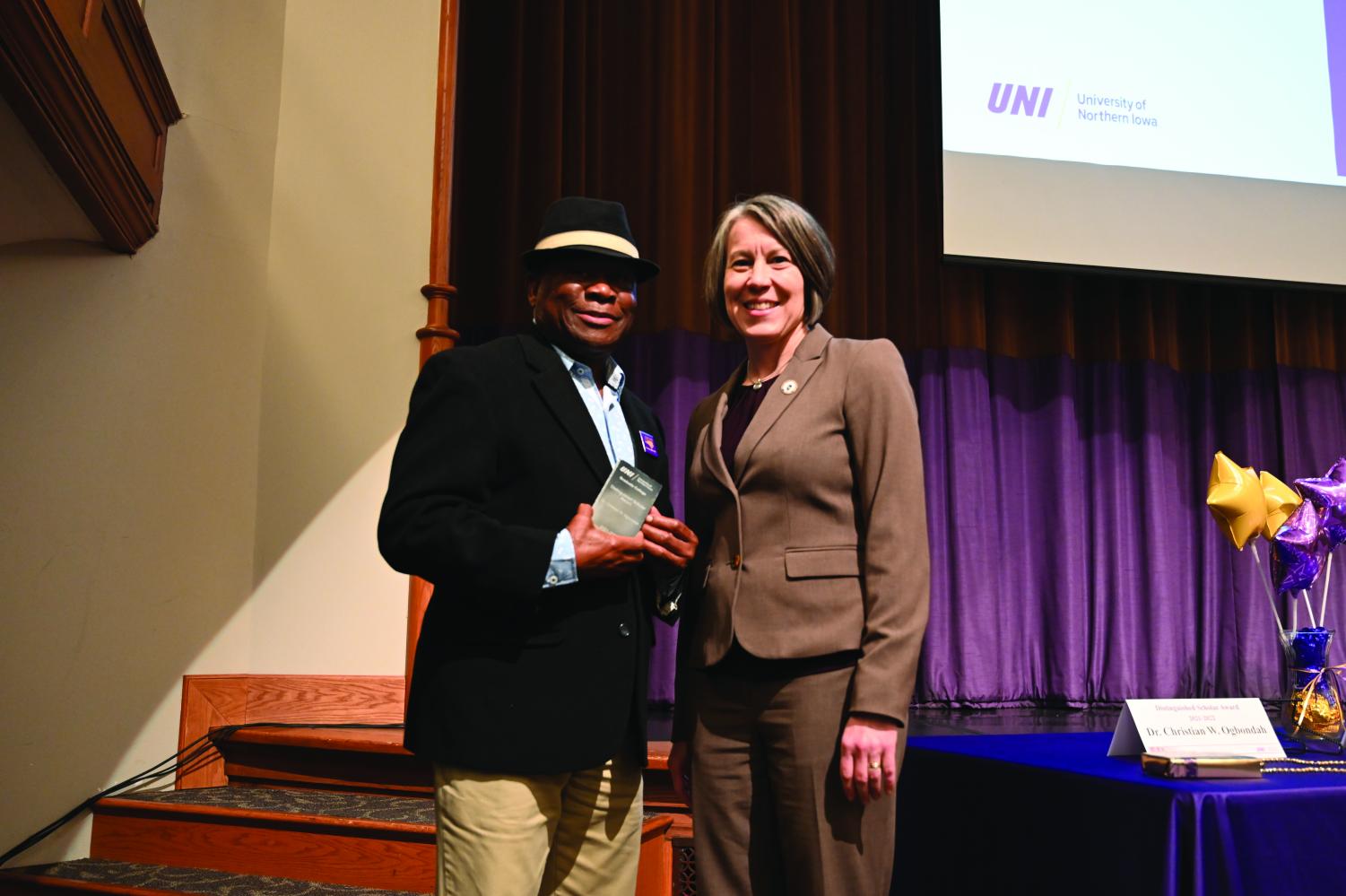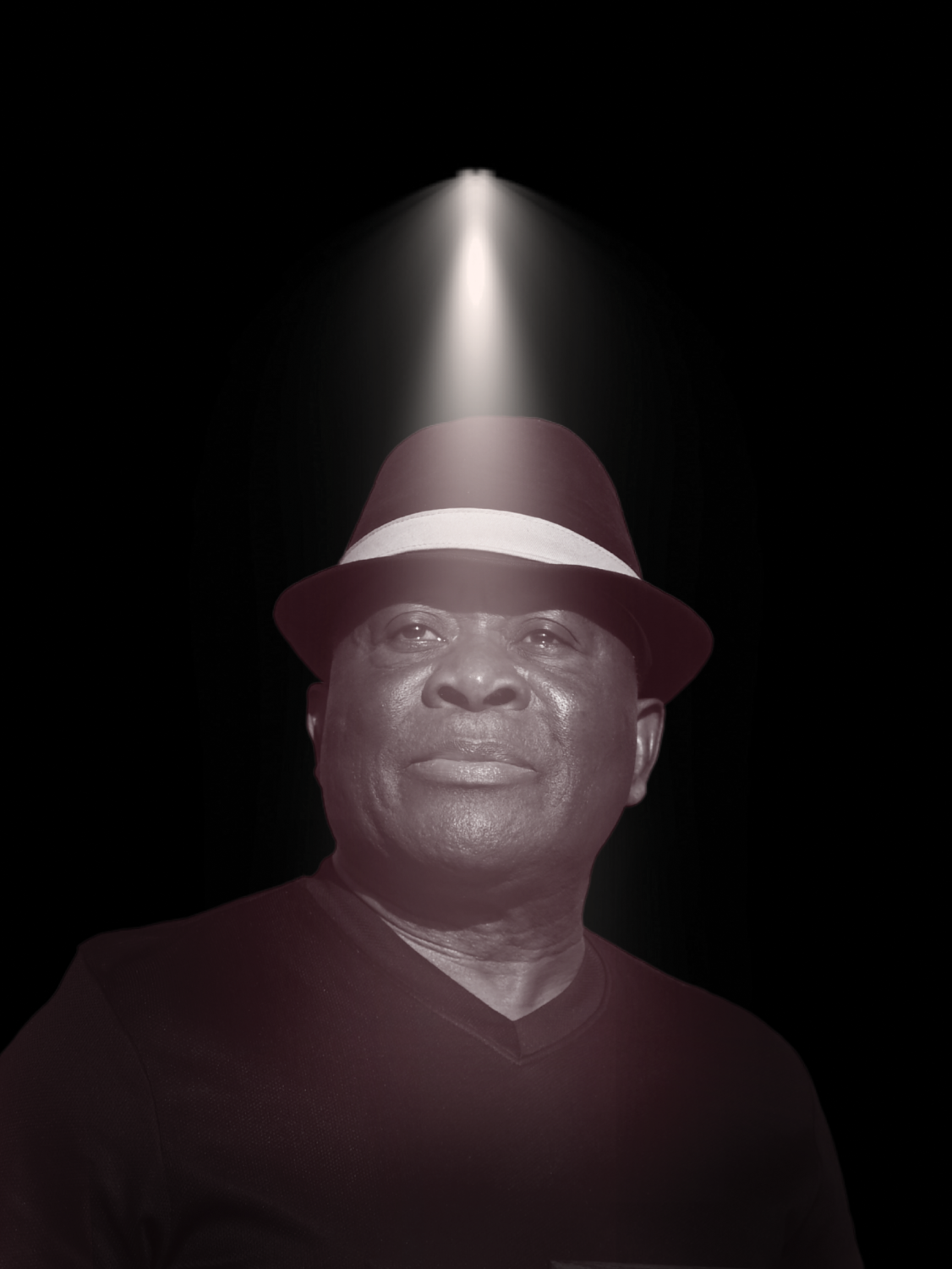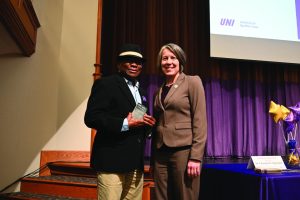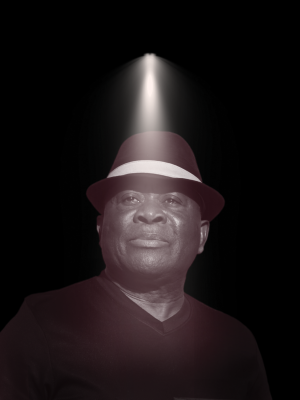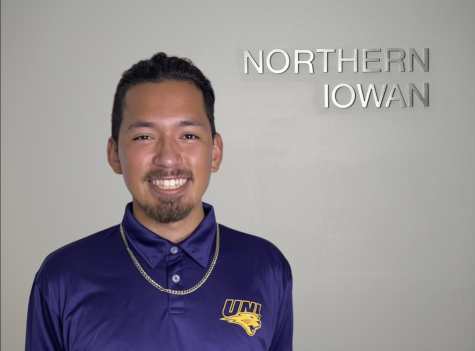The great legacy of Christian Ogbondah
Feb 2, 2023
After 36 years of teaching journalism and communication, Professor Christian Ogbondah, Ph.D., retired and made Iowa Black History.
Ogbondah recently retired in the 2022 spring semester. On April 28, 2022 Ogbondah received the Distinguished Scholar Award, for not only his work at University of Northern Iowa (UNI), but also for his legacy.
According to the UNI Graduate College website, the Distinguished Scholar Award, “Honors senior scholars and artists with a long and distinguished record of publications, exhibits and/or creative activities while a member of the UNI faculty and whose professional reputation is national (and international where appropriate).”
Ogbondah’s beginnings
Ogbondah’s legacy started when he was in high school in Nigeria. He saw a “Time” magazine with the breaking news of President Richard Nixon’s resignation following the Watergate scandal.
“I was intrigued by the fact that the most powerful president in the world, the President of the United States of America, could be brought down by the press.” Ogbondah said.
Ogbondah read the “Time” article and went to his father about wanting to be a journalist to write the story in his own country. From Nixon’s resignation, Ogbondah’s journalism career sparked. At the time of his discovery, he wanted to investigate corruption and poor leadership in his own community in Nigeria.
As a result, Ogbondah later pursued higher education, and from his education Ogbondah started a journey which has led him to numerous awards nationally and locally, including the opportunity to come to the University of Northern Iowa in 1986.
Ogbondah’s impact
When Ogbondah began his career at UNI he was hired and later was involved in the development of curriculum in public relations and journalism. During this time, the journalism minor was housed under the English department, but has been practiced by the Northern Iowan Newspaper since 1896. “I felt journalism belonged more in the broad field of communication. We are a complement to other aspects of communication such as public relations, radio, television and today digital media, so I advocated.”
In 1992, the journalism minor went to the communication and theatre arts department. Over time, the 24-credit-hour journalism minor was added to the Mass Communication Division, which was administered by Ogbondah as he was the coordinator of the journalism minor and its internship program for many years. The journalism emphasis was introduced in 2016 along with its rebranding from electronic media to digital media. Ogbondah was one of the three founding faculty along with Christopher Martin, Ph.D. who led the introduction of the Journalism emphasis and Anelia Dimitrova, Ph.D.
Global Impact
With Ogbondah’s global background, he introduced a number of new curriculums which impacted U.S higher education. He taught global mass communication systems, global public relations, global mass communication systems and international journalism. These courses never existed until he taught them.
“I wrote the description and then, of course, what was going to be in the curriculum. I wrote that also because I felt that our students needed to know about the journalism practice elsewhere in the world,” Ogbondah said. “There was no global public relations course anywhere in the United States. Most universities just offered public relations, that when I came here in 1986, the head department at the time…said ‘Chris, teach two classes and choose any other course you can teach like a seminar.’”
From there, Ogbondah introduced global public relations as an experimental basis and wrote an article about it. The article gathered attention from a professor at the University of Ohio, and Ogbondah wrote and contributed in the first chapter in introducing the global perspective in public relations in the first Book of “International public relations education: U.S. issues and perspectives.” Ogbondah sparked a perspective and conversations across the U.S. However, this was not the only time in which Ogbondah took the global stage.
In 1999, Nigeria transitioned from military rule to civil rule. During their transition, Ogbondah went to do a presentation with other global leaders to advocate for the Freedom of Information Act (FOIA). The FOIA is a law in the U.S. in which guarantees that the public has the right to request any record from federal agencies in an attempt to keep citizens aware of government practices. On March 15, 2002, Ogbondah went to Nigeria with Political Science Professor Pita Agbese, Ph.D. to help draft a new constitution in Nigeria. This law didn’t exist in Nigeria, and from his recommendation, including the efforts of other global leaders, this law later came into full fruition in 2011.
“I’m happy about it. Not my sole credit. But is the collective credit of scholars like me, teachers like me and civil society groups in Nigeria.” he said
Student Impacts
UNI Alum and Iowa Starting Line Journalist Amie Rivers was a student in Ogbondah’s class in 2000.
“To this day, I still remember Dr. Ogbondah hammering into my brain the idea of newsworthiness, or what counted as serious journalism. The definition that most interested me was “odd” — I hadn’t considered (and loved the idea) that serious journalism would entertain the macabre and the outlandish.” Rivers said. “But I didn’t think so at first: My journalism heroes were the stuffy politics writers, the droll chroniclers of dry copy. They were the important writers and they got the good jobs. Watergate was serious, after all! Who actually respected a writer who wrote about a man-biting dog?”
Ogbondah had a huge influence on Rivers and encouraged her to pursue the idea of feature writing during her time, including recognizing who are good sources and what kind of stories to pursue.
“Dr. Ogbondah was a serious journalist in his own right, and yet he was showing us that our writing didn’t always have to be serious — it could be playful, or it could talk about weirdos doing incredibly odd things, and that all of that is the fabric of life and deserves ink in our newspapers, too.” Rivers said.
Strategic public relations major Maddie Graves has had a similar experience to Rivers.
“When I was in his class, I needed a lot of encouragement to kind of get out of my box and get out of my norm that I was usually in,” She said. Graves mentioned that she was always encouraged to ask questions, and Ogbondah always came to class with fresh ideas.
“Whenever he would talk about his personal life and all of his plans, it really made us feel like we weren’t just students like that, we were people. He always made us feel human and that if you are going through it, that’s okay. That’s something I really appreciated in a faculty member.” Graves said.
Sports public relations major Meg Grove echoed Ogbondah teaching and inclusiveness of everything, but was also inspired by Ogbondah to pursue a minor.
“He was one of my first professors coming into journalism. After taking his class, Fundamentals of Journalism, I decided to minor in digital journalism. I really loved his teaching style and I learned a lot from it. I still use things that I learned from his class to this day.” Grove said
Grove and Graves even mentioned that Ogbondah was a fashion icon and was the best styled professor on campus.
His Retirement
With Ogbondah’s retirement, his legacy in Iowa, his writing and his teaching has impacted scholars across the country.
“I wasn’t going to (originally) apply for this award. (There are) so many persons in UNI scholars who have done so much at (the university). What is my chances as a Nigerian, as an African, as a Black man. But I remembered that the award selection was going to be done by blind folded reviewers, so I turned in my application.”
It wasn’t until the 2022 spring semester it was announced that Ogbondah earned the award.
“The award means a lot to me and my family. It shows that America is a wonderful opportunity…. I want the international community to understand that journalism can be used to foster national and international peace. Journalism can be used to foster international peace and understanding the way we frame stories. The way we report it, the angles will emphasize others can be critical in fostering international peace and understanding among nations… I’d like journalists to understand that they have a tremendous role to play in terms of international peace and security.” he said
Ogbondah leaves his legacy in Iowa and is back in his home country in Nigeria.
“I’m happy to be an ambassador for the University of Northern Iowa, and the state of Iowa, as well as the United states of America. As I leave UNI and go to the world. I am going back to Africa to start a Journalism training institute.” Ogbondah said.

